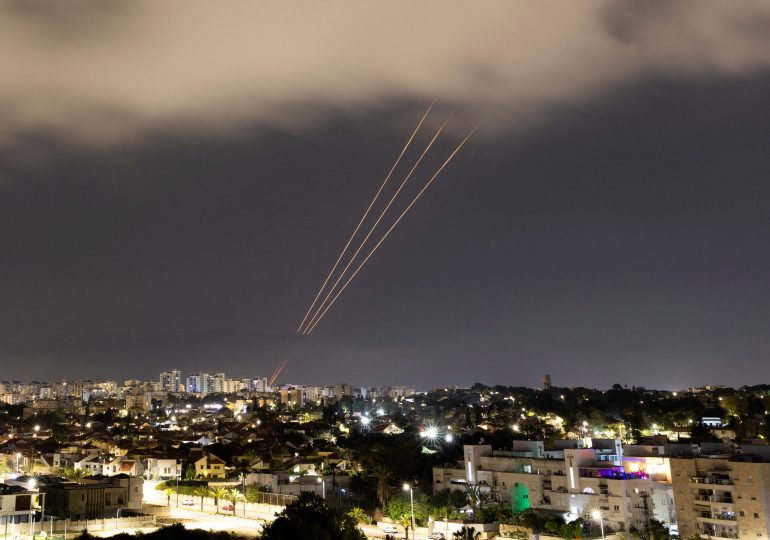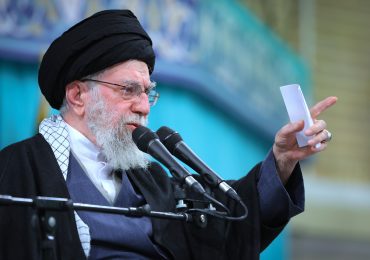The Iranian attack on Israel was historic. For the first time since the Iranian Revolution of 1979, the Ayatollah regime violated Israeli sovereignty directly without using any of its proxies, such as Hezbollah or Hamas. Iran, in this sense, has created a new equation for its conflict with Israel. Likewise, the ability to counter hundreds of Iranian missiles and drones was also unprecedented, as it resulted from an American-led coalition—which included the U.K., France, Jordan, and other countries—that originated in the Abraham Accords and continued with multiple defense regional agreements. This pivotal moment bore strategic implications that exceeded the sole interest of Israel. Here are the top five.
[time-brightcove not-tgx=”true”]
First, the response to the Iranian attack on Israel could affect geopolitical relations as we know them.
The Iranian attack on Israel was not only a local or regional event but a multinational one. In an era of a global war where the U.S. is on one side and Russia and China are on the other, the Israeli response will reflect the U.S.’s credibility as the leader of the Western world. In other words, it will define Western assurances regarding any country deeming itself part of the free world.
Indeed, President Biden warned Iran from attacking Israel by declaring yet another important “Don’t.” Well, they did. And now the world is watching. An aggressive response may lead to anarchy and force other players in the arena. A soft—or lack of—response could teach Iran and its allies that acts of aggression could occur without consequences. A restrained reaction to such a violent act of aggression in a world in which Russia had already invaded Ukraine may be one step too far. The secret here, hence, will be to find the right balance for deterring potential chaos agents such as Iran, yet not to accelerate the already sensitive reality.
Secondly, Iran endangered its two most significant investments—the Islamic Revolutionary Guard Corps and the nuclear program.
The first is an active ongoing project, which embodies not only a core element of the Iranian DNA but also the most significant terror group in the world. The second is an Iranian aspiration that is too close to realization. Israel, which lost substantial portions of its international legitimacy following the continuous war in Gaza, could use the momentum of international support not only to respond to Iran kinetically but to label the Islamic Revolutionary Guard Corps diplomatically and legally as a terror group. Moreover, it could encourage the entire U.S.-led coalition to compose a joint plan to counter the Iranian nuclear program just before its completion. A vital element of such a program will have to include the encouragement of the Iranian people to demand their liberty alongside unapologetic and decisive moves driven by the understanding that a nuclear Iran is a threat to the free world.
The third implication concerns the potential misuse of international law to undermine countries’ territorial integrity or political independence.
The Iranian narrative during the attack was fascinating, as was its audacity. Looking at the language it chose to use, it was clear Iran attempted to differentiate itself from its terrorist proxy group and portray itself as a legitimate sovereign state in an act of self-defense. Two unexhaustive indications for that were given while the drones were on their way to Israel. The first was a tweet by the Iranian mission to the U.N., which declared the attack was “conducted on the strength of Article 51 of the UN Charter pertaining to legitimate defense.” This article embodies one of the two exceptions—alongside a UN Security Council authorization—for prohibiting the use of force. The second indication was an Iranian declaration regarding its intention to hit military targets only. This is, of course, an act-the language of a wolf in sheep’s clothing. Accepting the notion that a country could launch 300 missiles and drones “in response to the Zionist regime’s aggression against our diplomatic premises in Damascus” undermines the core purpose of the U.N., which is to prevent wars from happening in the first place. Allowing this notion will open the gate for any country to cynically use Article 51 in a reality where the U.N. Security Council is under a near-constant deadlock anyway.
The fourth implication is that normalization between the Saudis and the Israelis is more likely than ever.
The world of October 6th has presented us with the breathtaking possibility of normalization between the two countries. At its core, there was a triangle of interest. Plainly speaking, the Israelis wanted to enjoy a relationship with a regional power; the Americans knew they could place a condition this with advancing a solution to the Israeli-Palestinian conflict; and the Saudis wanted, in return—among other things—a security agreement with the Americans, resembling those with Japan or South Korea.
The Iranian attack on Israel has provided the Saudis with a display of capability of such an agreement, demonstrated against the very same enemy they wish to protect themselves from: Iran. In this sense, the attack on Israel is likely to enhance normalization with the Saudis, not diminish it.
The fifth implication is that Israel must learn that there are no gifts.
Dependence on allies means the Israeli response will not happen in a vacuum. It will have to consider its allies and their domestic, political, and cultural sensitivities. That doesn’t mean there won’t be a strong reaction, but the rope isn’t as loose as Israel would have liked.
Looking forward to the near future, this means the Israeli ability to manoeuvre, literally, in other areas, such as Lebanon or Gaza, will be even more limited. The outcome may force Israel and its allies to (finally) convene into a joint “Day-After” plan. Such a plan must ensure a Palestinian state isn’t perceived as the direct reward for the October 7th massacre and the Iranian attack on Israel. Still, it must ensure the region has a clear path for the next decade or two.
The task of translating these implications into practical action items is now laid on the shoulders of world leadership. The choices they’ll make will determine if the Iranian attack on Israel will be perceived, in retrospect, as a tragedy or as an opportunity.
Leave a comment






